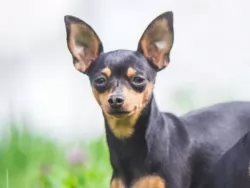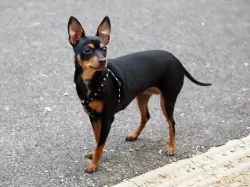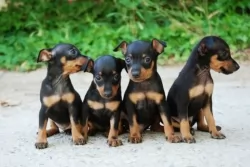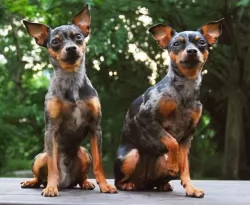 MyDogBreeds
MyDogBreeds Prazsky Krysarik is originated from Czech Republic but Norwegian Lundehund is originated from Norway. Prazsky Krysarik may grow 17 cm / 6 inches shorter than Norwegian Lundehund. Both Prazsky Krysarik and Norwegian Lundehund are having almost same weight. Both Prazsky Krysarik and Norwegian Lundehund has same life span. Prazsky Krysarik may have less litter size than Norwegian Lundehund. Prazsky Krysarik requires Low maintenance. But Norwegian Lundehund requires Moderate maintenance
Prazsky Krysarik is originated from Czech Republic but Norwegian Lundehund is originated from Norway. Prazsky Krysarik may grow 17 cm / 6 inches shorter than Norwegian Lundehund. Both Prazsky Krysarik and Norwegian Lundehund are having almost same weight. Both Prazsky Krysarik and Norwegian Lundehund has same life span. Prazsky Krysarik may have less litter size than Norwegian Lundehund. Prazsky Krysarik requires Low maintenance. But Norwegian Lundehund requires Moderate maintenance
 You won’t find this dog outside the Czech Republic, which is a pity, because as one of the smallest breeds, it’s a great choice for people with small properties.
You won’t find this dog outside the Czech Republic, which is a pity, because as one of the smallest breeds, it’s a great choice for people with small properties.
It’s not a new breed, and there are records of it having been around in the Middle Ages, being valuable for catching rats.
The breed went through a decline in the 1980s, but their breeding program was started, although it isn’t an FCI acknowledged breed.
 The Norwegian Lundehund hails from the island of Vaeroy, Norway and was created for the purpose of puffin hunting.
The Norwegian Lundehund hails from the island of Vaeroy, Norway and was created for the purpose of puffin hunting.
Now that these puffins are a protected species, the dog is no longer used for hunting and has become a companion dog.
The breed decreased in numbers during- and after World War II because the islands where he came from had an outbreak of distemper. It was in 1963 that another outbreak occurred and the dogs were almost wiped out. A breeding program saw their numbers being built up.
It was in 2011 that the dog was recognized by the American Kennel Club.
 The Pražský Krysařík is a small dog standing at between 20 and 23cm in height and weighing between 1.5 and 4kg.
The Pražský Krysařík is a small dog standing at between 20 and 23cm in height and weighing between 1.5 and 4kg.
The Prazsky Krysarik may be small, but he is robust with a broad chest and a lean body with a fragile, lizard like head, much like a Chihuahua. The legs are fragile and thin. The ears are fairly large and erect and he has a long tail. The coat is short, thin and glossy and is mostly black and tan.
The Prazsky is known for its playful, lively nature, and they’re spunky and intelligent dogs too and will be more than capable of being trained and socialized.
Even though he is such a tiny dog, it will be to his benefit to have him trained and socialized.It makes the dog well balanced and they become well behaved so you can take them anywhere.
They are such friendly, social little dogs too and they love being around their human family. They certainly don’t like being left in the backyard, cut off from their human companions.
They're small enough to be indoors a lot, being able to easily slot into life in the city or in the countryside. They get on well with children and other pets but kids will have to be taught how to treat him with kindness and respect, as those tiny little legs could snap.
 As a spitz-type dog, with the Lundehund you’ll recognize the typical spitz-dog characteristics – the erect ears and the tail that curves over the back.
As a spitz-type dog, with the Lundehund you’ll recognize the typical spitz-dog characteristics – the erect ears and the tail that curves over the back.
He is a small to medium sized dog standing at 30 – 40cm and weighing 6 – 9kg. He is an active dog and is as agile as a fox.
He has a dense double coat which is white, reddish/tan with some black tips. He is a dog which sheds constantly.
Strangely this dog has 6 toes and his rear pads have elongated foot pads which have helped the dog be able to climb over rocks. He also has a flexible type of neck that is capable of craning back so that the head touches the spine. The dog has some unique features and wriggling in and out of small spaces is another of his characteristics. In fact he can do things that you would not imagine a dog could do.
When you have a Lundehund in your life you’ll agree he has a happy, amicable personality. He is non-aggressive.
He will require training and socialization as he is an independent dog who can be obstinate. He is quite aloof with strangers too and once he starts barking at them he tends to want to continue. Training him will put an end to that irritating behavior. He is a loving, loyal dog, enjoying the company of his human family.
 A Prazsky is a dog just like any other – he just wants to be a member of the family. He badly wants the love and attention of his human family but he wants to give love and attention in return too.
A Prazsky is a dog just like any other – he just wants to be a member of the family. He badly wants the love and attention of his human family but he wants to give love and attention in return too.
They make wonderful pets and he is more than willing to put aside playing outdoors to come inside and just be by your side.
These little dogs are a great choice for those looking for a small-sized dog. They’re such friendly, responsive little dogs and they don’t come with many health-related issues. The Prague Ratter adapts well to city or country living and he is prepared to be loyal and loving wherever you take him.
 The Norwegian Lundehund isn’t your everyday dog and in fact he is known as a primitive breed. Perhaps he wouldn’t be the best dog to have if you’re a first-time dog owners as training is quite difficult too.
The Norwegian Lundehund isn’t your everyday dog and in fact he is known as a primitive breed. Perhaps he wouldn’t be the best dog to have if you’re a first-time dog owners as training is quite difficult too.
People who are willing to take a chance on him say that with training and socialization he can become a loving canine companion.
 The Prazsky is a robust dog but there are some diseases that can affect a dog, and skin symptoms such as itchiness or an unusual lump will need to be seen to.
The Prazsky is a robust dog but there are some diseases that can affect a dog, and skin symptoms such as itchiness or an unusual lump will need to be seen to.
Other problems such as excessive drooling, cloudy eyes with discharge, distended abdomen and discolored gums are all reasons to seek the help of your vet. Small dogs like this tend to be prone to dental disease, so keep an eye on his teeth.
Some people look at buying health insurance because they know too well that veterinary costs can add up quickly, even for a tiny little dog like this.
 The Lundehund is prone to digestive disorders but even so he has got a good chance of living to be 11, 12, 13 or 14 years of age with good care.
The Lundehund is prone to digestive disorders but even so he has got a good chance of living to be 11, 12, 13 or 14 years of age with good care.
He is however, one of these dogs prone to health problems of which chronic intestinal disease is one. Its the kind of illness that can recur because it is resistant to treatment.
Experts on these dogs say that they should have a fecal test done every 6 months or so, saying that one thing a bit negative with this dog breed is that you may well be forking out quite a bit on chronic veterinary care.
 It doesn’t matter what size dog you have, each one requires high quality dog food, whether commercially manufactured or home-prepared.
It doesn’t matter what size dog you have, each one requires high quality dog food, whether commercially manufactured or home-prepared.
Portion sizes should be appropriate to your dog’s size and activity levels. Dogs thrive on simplicity when it comes to food as this prevents them having digestive problems. Boiled chicken, brown rice or pasta and sweet potatoes, spinach and carrots all chopped up and added to your dog’ dry kibble as a treat every now and again will do wonders for your pet.
Fresh, cool water should always be available to your pet around the clock.
The short, smooth coat of the Pražský Krysařík makes him a truly low maintenance little dog. Just give him a brush twice a week and wipe him down with a damp cloth and he’ll always be gleaming like a new penny.
Have his nails trimmed and always check his teeth during these grooming sessions. Smalls dogs battle with dental disease, and this can cause havoc in the body of your small pet.
Walk your tiny pet at least once a day. It just gives him the chance to sniff around a bit and see the world in a new light. He doesn’t require a lot of physical activity, but they will still need regular exercise to stave off obesity.
Get your Pražský Krysařík spayed or neutered if you’re not intending to allow your pet to have puppies. These little dogs can have between 1 – 3 puppies. There are many pros to this procedure for dogs.
Make sure his vaccinations are up to date to avoid some of the deadly dog diseases you get such as parvo-virus, distemper and rabies.
 Like any other dog, the Norwegian Lundehund will do well on the best quality food. If you buy him commercially manufactured food, check the ingredients on the packaging. Lots of these lower quality foods are made from ingredients that are toxic for your pet, so buy a good quality one.
Like any other dog, the Norwegian Lundehund will do well on the best quality food. If you buy him commercially manufactured food, check the ingredients on the packaging. Lots of these lower quality foods are made from ingredients that are toxic for your pet, so buy a good quality one.
Buy food according to your dog’s age and activity levels. To make his meals more interesting, add in some delicious home prepared food for him. Stay away from spicy, exotic foods and go for something like boiled chicken, brown rice and vegetables. Some raw meat added to the kibble from time to time can also do wonders for your pet as he requires a high-protein diet. Make sure he always has access to fresh, cool water.
Other ‘caring’ things to do to make sure your pet has a quality lifestyle is -
Brush his hair twice a week as he is a fairly heavy shedder. Not only does it keep the coat nice and shiny, it builds up a bond between you and your pet.
Check his ears and eyes regularly to make sure they are free from infection.
Clip his nails when they get long as your pet can hurt himself if the nails hook onto things.
Whenever he is ill, get him to the vet for a check-up.
Make sure he has a nice safe, dry, warm, snug place to sleep.
Keep him well exercised. A dog that is put into the backyard and more or less forgotten will be most miserable. Why get a pet if you don’t want to make him a 100% part of the family?